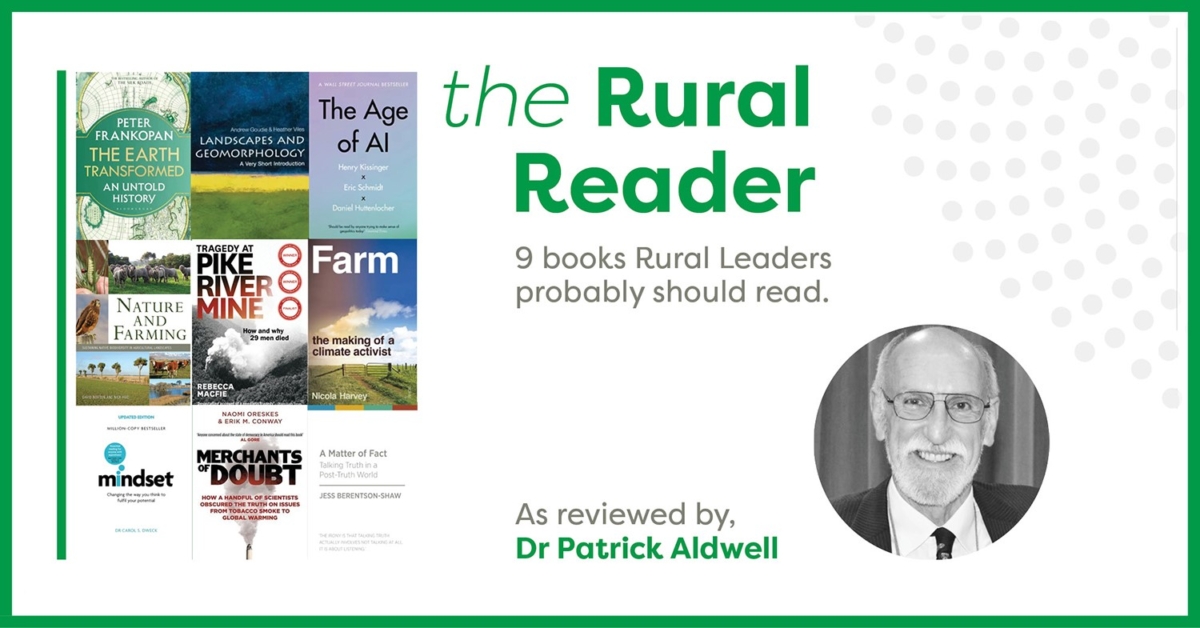
Dr Patrick Aldwell will be back with a new book review in the next issue. In the meantime, here’s a resource of the nine books he has reviewed so far. Let this be your go-to shelf of sure bets when it comes to good rural reads.
1. Tragedy at Pike River. How and why the 29 men died. Rebecca MacFie (2013)
In his first book review for the Rural Reader, Patrick reviewed Tragedy at Pike River. This book looked at some of the causing factors of the tragedy which led to the deaths of 29 men.
2. The Age of AI and Our Human Future. Henry Kissinger et al.
In his second ‘Rural Reader’, Patrick reviewed The Age of AI and our Human Future.
This book is by an author who is a genuine big-picture thinker. It provides a dispassionate view of current uses and opportunities that new AI tools could provide.
3. Farm – the making of a climate activist. Nicola Harvey (2022).
In this, the third instalment of the Rural Reader, Patrick reviewed Farm – the making of a climate activist.
The author, it is clear, has strong ideals about farming beef, reducing GHG generation and improving animal welfare. For Patrick it was a story about tenacity, courage, community, and hope in the face of a worthy challenge. A story that reflects what many in New Zealand agriculture are dealing with at present.
4. Mindset – changing the way you think to fulfil your potential. By Dr Carol Dweck.
In the next pithy chapter of the ‘Rural Reader’, Patrick reviewed Mindset – changing the way you think to fulfil your potential. By Dr Carol Dweck.
On this book Patrick wrote, “Occasionally, you come across one of those airport books that is really worth reading. Based on research, the book focuses on two principal mindsets: the fixed mindset and the growth mindset.” Well worth a read if you (like most of us) suffer from the odd bout of imposter syndrome.
5. A Matter of Fact: Talking Truth in a Post Truth World. By Jess Berensten Shaw.
Dr Patrick Aldwell, reads a lot of books. He’s also a believer in the power of lifelong learning. One subject close to his heart is that of mis-information and dis-information.
In this ‘Rural Reader’, Patrick reviewed – A Matter of Fact: Talking Truth in a Post-Truth World. It’s a book that investigates how organisations and individuals generate information to influence public opinion.
The author presents many examples of how information is misused intentionally as well as unintentionally, and the pitting of evidence against beliefs and values.
6. Merchants of Doubt. Naomi Oreskes and Erik M.Conway (2012)
The truly great thing about this virtual book shelf of reviews is that Dr Aldwell has done the gruelling curation yards for you.
In this ‘Rural Reader’, Patrick reviewed Merchants of doubt. It’s a book that builds on the previously mentioned ‘A Matter of Fact’ by exploring a more sinister, well-planned and well-funded approach to disinforming the public on matters of global concern.
7. Nature and Farming – Sustainability Biodiversity in Agricultural Landscapes. David Norton and Nick Reid (2013).
In this ‘Rural Reader’, Patrick took a closer look at Nature and Farming – Sustaining Biodiversity in Agricultural Landscapes. David Norton and Nick Reid (2013).
In his review, Patrick mentions that one of the most useful chapters, “Management Planning and Goal Setting”, should be of particular interest to those involved in or with catchment groups. A great publication to have in your toolbox.
8. Landscapes and geomorphology – A very short introduction. Andrew Goudie and Heather Viles (2010).
Here Patrick reviewed Landscapes and geomorphology – A very short introduction.
The book is part of a series and is relevant for the Food and Fibre sector at a time of more intense storms and damage to farm infrastructure.
9. The Earth Transformed – An Untold History. Peter Frankopan (2023)
The Earth Transformed – An Untold History by Peter Frankopan, is an amazing story that pulls credible material from Frankopan’s vast larder to provide an easy-to-read context that helps explain the situation we are in on planet Earth.

























